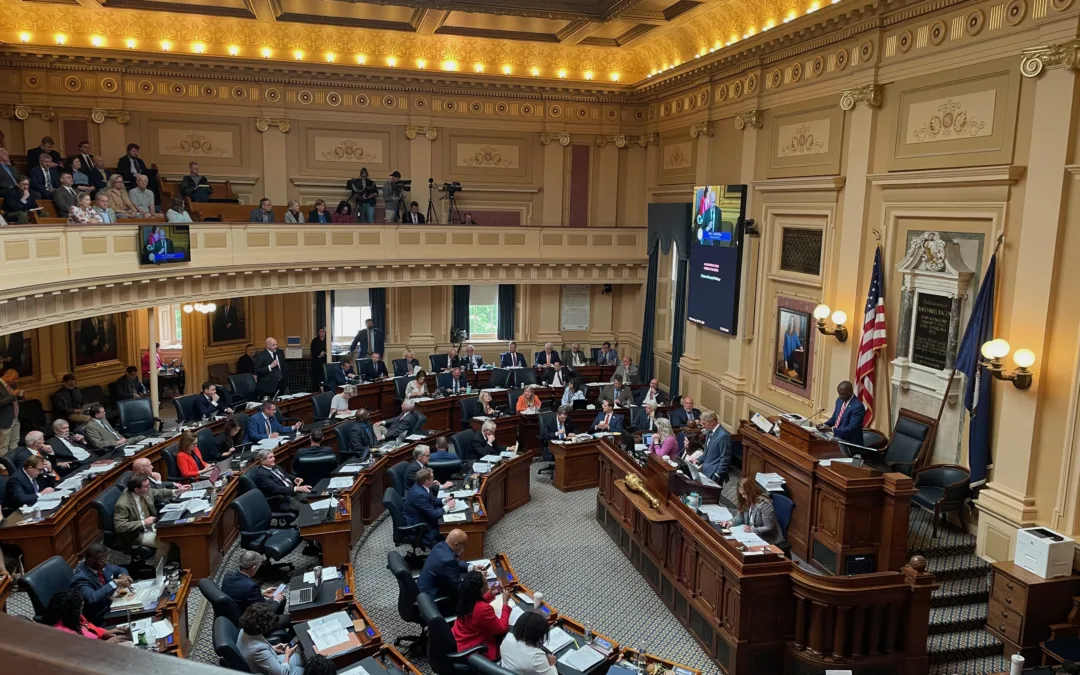
The Virginia Board of Education discussed the possibility of switching to an accountability system rather than continuing with accreditation.
Accreditation? Accountability? What’s in a name?
While mostly overshadowed by the public comment and following board discussion about Virginia’s history standards during the Virginia Board of Education’s Nov. 17 meeting, another important conversation took place the day before during the board’s work session.
There, members of the board discussed the possibility of changing Virginia’s current system of school accreditation to school accountability. Beyond nomenclature changes to the Code of Virginia, the proposed adjustment could implement school grading systems, per se, as seen in some states like Florida.
Like Virginia, Florida also has a Republican governor, Ron DeSantis. The incumbent recently won reelection. Virginia Gov. Glenn Youngkin—a major force behind the push toward accountability—made headlines alongside DeSantis in April when news broke that Accelerate Learning, which global investor The Carlyle Group acquired in 2018 when Youngkin was the firm’s co-CEO, was the only company permitted to supply math textbooks in Florida.
Given the at-length conversation that occurred at the work session over accountability in place of accreditation, it appears there could be a shift in Virginia toward a Florida-like school model. Part of that change could include a letter rating system in Virginia, pitched as a way to make it easier for parents to assess their local school’s performance.
Following Florida?
If implemented, a letter rating system could give Virginia schools an ‘A’ through ‘F’ grade similar to a student’s report card. Virginia Superintendent of Public Instruction Jillian Balow mentioned the letter rating system Florida put in place during the discussion with the board on the matter.
“We saw with Florida, 60% of the school divisions did not get an ‘A’ rating,” Balow said. “They got a ‘B’ or a ‘C’ and that’s a big chunk of them.”
Balow suggested a restructuring of the Division of School Quality, Instruction, and Performance geared toward supporting school divisions. In that plan, she emphasized the need for training and support for school leadership and teachers, but noted that “we can’t do that if we don’t have accountability.”
Rather than go through a normal process to enact changes, Balow pushed toward moving forward by utilizing an emergency timeline to put the accountability practice into place.
“There is an education emergency that needs to be addressed,” Balow said. “We see that in our NAEP (National Assessment of Educational Progress) scores. We see that in our SOLs (Standards of Learning). We see that in our schools every day. And when we have 89% of our schools that are fully accredited, we aren’t seeing every student in the Commonwealth of Virginia. And a new accountability system can help us get [there].”
The Fast Track
Multiple members of the board—including Youngkin appointee Dr. H. Alan Seibert—expressed concerns about moving the accountability process forward through emergency rule-making.
“It is [an] incredibly fraught process—very complex, very difficult,” Seibert said. “Still absolutely worth doing, but if we’re going to get behind the wheel of this car and start driving it, we’ve got to manage the speed so that there’s not collateral damage.”
Seibert didn’t suggest holding the idea at bay for four or five years, but expressed concern that moving too quickly could have negative impacts.
“A year to build it thoughtfully with the people in the Commonwealth of Virginia who have been asking for a modernization of assessment accountability for years, there’s enthusiasm and desire to do this,” Seibert said. “To do it in an emergency fashion rather than an urgent fashion would squash the opportunity to really capitalize on that enthusiasm about doing this right and doing this well.”
Former Gov. Ralph Northam appointees President Daniel Gecker, Vice President Dr. Tammy Mann, and board member Anne Holton also opposed the fast track proposal.
While letter rating was specifically mentioned in the meeting, that idea wasn’t set in stone. To that point, Holton expressed concern over not knowing exactly what would be included in the emergency action toward an accountability shift.
“I don’t know how you’re going to get these bills through without telling the legislature what kind of weighted index you’re going to be using for whatever this system is,” Holton said. “I mean, we know they rejected an ‘A’ through ‘F’ before. So what is the weighted index?”
Gecker expressed similar concerns.
“It is difficult for me to conceive of writing a letter asking for an emergency declaration when I have no idea what it is I’m going to be asking, you know, the regs,” Gecker said. “We just haven’t done it that way before. I’m uncomfortable with the idea of asking the governor for carte blanche (complete freedom to act as one wishes or thinks best) on this. And I think we’re required to lay out what it is we want to do.”
The board did not enact an emergency timeline for a potential accountability switch during the work session.
Politics

Youngkin, Democrats to start over on budget talks
The Republican governor stood with Democratic leaders in the General Assembly on Wednesday in a bid to ease tensions over their budget debate....

VIDEO: Domestic abuse victims speak out against the gun law bills Gov. Glenn Youngkin vetoed
Senate Bill 47 and House Bill 46 aim to close the loophole that allows offenders to transfer their firearms to someone else instead of relinquishing...
Local News

Virginia verses: Celebrating 5 poetic icons for National Poetry Month
There’s no shortage of great writers when it comes to our commonwealth. From the haunting verses of Edgar Allan Poe, who found solace in Richmond's...

Join the fun: Recapping Family Literacy Night’s storybook adventures
When’s the last time you read a book aloud with a loved one? If it’s difficult to answer that question, then maybe it’s time to dust off that TBR...





